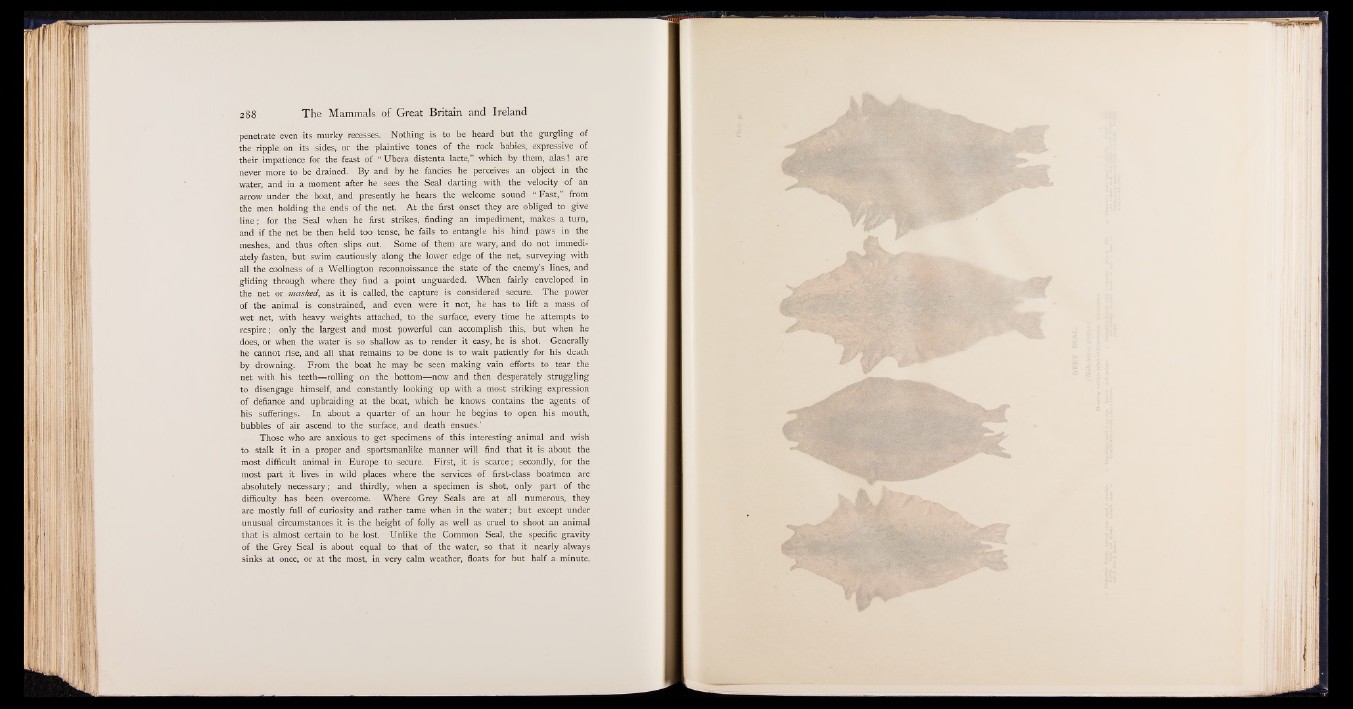
penetrate even its murky recesses. Nothing is to be heard but the gurgling of
the ripple on its sides, or the plaintive tones of the rock babies, expressive of
their impatience for the feast of “ Ubera distenta lacte,” which by them, alas! are
never more to be drained. By and by he fancies he perceives an object in the
water, and in a moment after he sees the Seal darting with the velocity of an
arrow under the boat, and presently he hears the welcome sound “ Fast,” from
the men holding the ends of the net. At the first onset they are obliged to give
line; for the Seal when he first strikes, finding an impediment, makes a turn,
and if the net be then held too tense, he fails to entangle his hind paws in the
meshes, and thus often slips out. Some of them are wary, and do not immediately
fasten, but swim cautiously along the lower edge of the net, surveying with
all the coolness of a Wellington reconnoissance the state of the enemy’s lines, and
gliding through where they find a point unguarded. When fairly enveloped in
the net or masked, as it is called, the capture is considered secure. The power
of the animal is constrained, and even were it not, he has to lift a mass of
wet net, with heavy weights attached, to the surface, every time he attempts to
respire; only the largest and most powerful can accomplish this, but when he
does, or when the water is so shallow as to render it easy, he is shot. Generally
he cannot rise, and all that remains to be done is to wait patiently for his death
by drowning. From the boat he may be seen making vain efforts to tear the
net with his teeth— rolling on the bottom— now and then desperately struggling
to disengage himself, and constantly looking up with a most striking expression
of defiance and upbraiding at the boat, which he knows contains the agents of
his sufferings. In about a quarter of an hour he begins to open his mouth,
bubbles of air ascend to the surface, and death ensues.’
Those who are anxious to get specimens of this interesting animal and wish
to stalk it in a proper and sportsmanlike manner will find that it is about the
most difficult animal in Europe to secure. First, it is scarce; secondly, for the
most part it lives in wild places where the services of first-class boatmen are
absolutely necessary; and thirdly, when a specimen is shot, only part of the
difficulty has been overcome. Where Grey Seals are at all numerous, they
are mostly full of curiosity and rather tame when in the water; but except under
unusual circumstances it is the height of folly as well as cruel to shoot an animal
that is almost certain to be lost. Unlike the Common Seal, the specific gravity
of the Grey Seal is about equal to that of the water, so that it nearly always
sinks at once, or at the most, in very calm weather, floats for but half a minute.